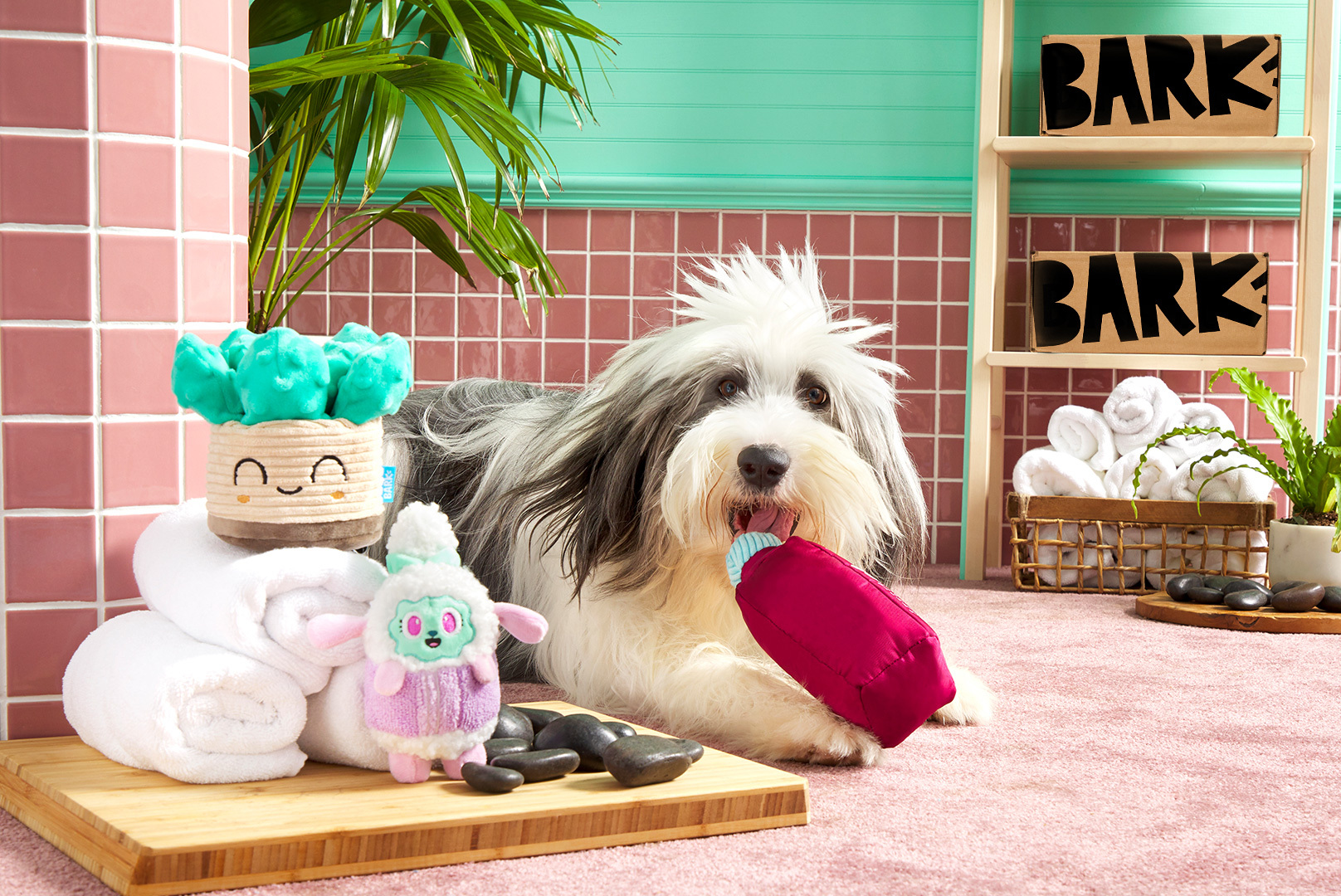Goldendoodles are smart, loving, and absurdly photogenic (and they know it). When you look into those big beautiful puppy dog eyes, you know they can do no wrong—but that doesn’t mean things won’t go wrong throughout their lives.
Because they are a mixed breed, goldendoodles are susceptible to all the health issues that affect both poodles and golden retrievers, as well as common big-dog concerns.
Are you wanting to know how long do goldendoodles live and how you can keep them healthy? Besides regular veterinary care, one of the best ways to make sure your dog breed is healthy is to know what to expect and to keep an eye out for signs of common maladies. With that in mind, we’ve created a rundown of common goldendoodle health issues, so they can continue “doing no wrong” for many dog years to come. You can also check out our goldendoodle guide to learn all there is to know about this dog breed.
#1 Joint Health and Hip Dysplasia
Because of their golden retriever origins, hip dysplasia is a common health issue for goldendoodles. A genetic disorder that is mostly experienced by larger dogs, it occurs when the ball-and-socket joint in the hip stops fitting together properly. This stress causes the joint to deteriorate over time, resulting in increasing discomfort in your pet.
As your goldendoodle ages, keep an eye out for any of the following symptoms that might be indicators of hip dysplasia:
- Decreased activity or motion – Your goldendoodle might stop jumping or climbing stairs, and generally be less active. If they stop showing interest in physical activities they used to love, consider this a red flag.
- Changes to their gait – You might notice your goldendoodle puppy swaying or bunny-hopping on their back legs.
- Musculature changes – You might notice their thighs becoming less muscular as they use those limbs less. In contrast, you might also observe their shoulders bulking up as they rely on those muscles more.
Whether or not your goldendoodle will suffer from hip dysplasia is largely dependent on its size. While there are several goldendoodle facts to know, one is that this pup ranges in many different sizes. Goldendoodle sizes can vary greatly depending on if the parent is a toy poodle or a standard poodle. While the condition is genetic and therefore unavoidable, there are still numerous preventative measures you can take to stave off hip dysplasia and maintain your goldendoodle’s joint health:
- Maintain a healthy weight – Goldendoodles are very active dogs and love to exercise. An overweight goldendoodle is more likely to develop hip dysplasia, so make sure you’re indulging your pup’s natural desire to zoom around.
- Choose a joint-friendly diet – Try to find a food that’s high in glucosamine, or add glucosamine supplements to their routine—with the go-ahead of a vet. Try to limit your goldendoodle’s calcium intake as too much can be bad for their joints.
If your goldendoodle develops hip dysplasia, this health problemcan be treated surgically or managed with pain relief medicines. Consult with your veterinarian to determine which course of treatment is best for your pet.
A Note on Patellar Luxation
While hip dysplasia is the most common joint ailment amongst larger goldendoodles, smaller goldendoodles should be monitored for patellar luxation. Many smaller breeds of poodle, such as the toy poodle, suffer from this health problem which occurs when the patella dislocates, leading to difficulty extending the leg.
Patellar luxation can occur in one or both of a goldendoodle’s hind legs. The symptoms and treatment are largely similar to hip dysplasia. However, because patellar luxation can happen early in a goldendoodle’s life and often lead to arthritis in the future, surgery is often recommended—and ongoing vigilance is extra important.
#2 Ear Infections
Both poodles and golden retrievers are prone to ear infections because of their floppy ears; naturally, goldendoodles are no different. Your goldendoodle might contract an ear infection from fungal growth due to moisture (especially if they’re an avid swimmer), allergens, or possibly ear mites.
While ear infections can be annoying for your goldendoodle (and for you as the pet owner,, thanks to the regular schedule of eardrops), the good news is that they are treatable with medicine prescribed by your veterinarian. The symptoms to look for include:1
- Dark discharge – If you’re seeing a darker-than-normal waxy discharge in your goldendoodle’s ears, that’s usually a sign of an ear infection. By regularly cleaning your doodle’s ears with cotton balls and an ear-cleaning solution, you’ll be able to stop ear infections if they ever arise.
- An unpleasant odor – Bad smells emanating from your goldendoodle are always a sign that something might be amiss. When the odor is coming from their ears, it’s time for a check-up.
- Excessive head-shaking or pawing – Take note if your goldendoodle seems more preoccupied with its ears than the tennis ball you just chucked across the yard.
You can help prevent ear infections by keeping your goldendoodle’s ears clean and dry. For goldendoodles that love the water (they’re out there in spades), you might consider putting cotton balls in their ears before swimming (or bathing) to help prevent moisture accumulation.
#3 Epilepsy
Golden retrievers and poodles are both prone to epilepsy, which means our beloved goldendoodles are, too. Epilepsy is a neurological disorder that manifests in seizures and can occur if a goldendoodle suffers from a stroke or head trauma, or if they have a malformation in their brain. Epilepsy can also be genetic with underlying neurological causes that even the top vets don’t entirely understand.
An epileptic seizure typically includes:3
- Shaking, jerking, and collapsing
- Loss of muscle control or consciousness
- Drooling, jaw lock, chewing their tongue
- Accidental urination or defecation
If your goldendoodle puppy is experiencing a seizure for the first time, it’s important to bring them to the veterinarian as soon as possible to determine whether the seizure was caused by epilepsy or an external factor (like if your goldendoodle ate something toxic).4
Watching your goldendoodle have a seizure can be a frightening experience for pet parents of all dog breeds. Try not to panic, though. An epileptic seizure should end within a few minutes. There are a few things you can do during the seizure to help your golden doodle:
- Note the seizure details – As a pet owner, it’s important to record the duration of your goldendoodle’s seizure to help your veterinarian diagnose itlater. (Any fit longer than five minutes is considered an emergency and you should bring your goldendoodle in for help immediately.) While it might seem strange in the moment, recording your goldendoodle’s seizure will also help your vet make a diagnosis.
- Make the space safe – Depending on where your goldendoodle is having its fit, you may need to gently move them so they don’t fall down stairs or hit their head on nearby furniture. You may also want to take other pets out of the room as their reactions can be unpredictable.
- Don’t put anything in your goldendoodle’s mouth – Don’t worry, your goldendoodle isn’t going to choke on its tongue. Forcing your fingers or an object in your goldendoodle’s mouth during a seizure is unnecessary and dangerous for both of you.
- Comfort your goldendoodle verbally – Speak to your doodle in a soft voice. You may pet them, but be aware that your dog might be confused and could snap at you, so be mindful of their state. If it seems like they’re overheating, you could consider placing a cold washcloth on their paws. Alternatively, some goldendoodles experiencing fits take comfort in being wrapped in a blanket.
After a seizure occurs, your goldendoodle might immediately bounce back as though nothing happened. Dogs are resilient like that. They might be excessively hungry or thirsty, which is normal, so make sure they have access to all the fluids they might want. On the other hand, some goldendoodles may be exhausted after a seizure, so you should let them rest.
The good news is that epilepsy can be managed with medication, so their first seizure may be the only one. Consult your veterinarian for more information.
#4 Cancer
Inevitably, we have to talk about cancer. Among golden retrievers, cancer is quite common, which means that goldendoodles are also at high risk. As with people, there are numerous types of cancers that can affect goldendoodles and they are often undetectable before your pup starts exhibiting symptoms like loss of appetite, malaise, or irritability.
If you feel or spot a lump on your goldendoodle, it’s important to have them checked out by a veterinarian to make sure it’s benign and not malignant.
While it’s impossible to prevent cancer, healthy dogs that are well-nourished and exercise often have a better chance of avoiding the disease.
Happy and Healthy Goldendoodles with Bark
We hope that you’ve learned what to keep an eye out for when it comes to goldendoodle health problems, and that you feel better equipped to care for them as they age.
If you’re looking for an actionable change you can make today, check out Bark’s dog food for doodles. Our chow is made with a chicken and brown rice blend that’s packed with important nutrients, including glucosamine, that will help maintain your dog’s bones and joints.
Sources:
- American Kennel Club. Hip Dysplasia in Dogs. https://www.akc.org/expert-advice/health/hip-dysplasia-in-dogs/
- Goldendoodle Advice. Ear Infections In Goldendoodles: Three Common Problems & Treatments (Veterinarian Weighs In!). https://goldendoodleadvice.com/ear-infections-in-goldendoodles-three-common-problems-treatments/
- Fetch by WebMD. Seizures in Dogs: Causes, Symptoms, and What to Do. https://pets.webmd.com/dogs/dog-seizure-disorders
- Popular Doodle. Goldendoodle Seizures & Epilepsy FAQs (Veterinarian Advice). https://populardoodle.com/goldendoodle-seizures-epilepsy-faqs-veterinarian-advice/
- Pride & Prejudoodles. Goldendoodle Lifespan: Get the Facts on Your Pup’s Life Expectancy. https://www.prideandprejudoodles.com/blog/goldendoodle-lifespan/





